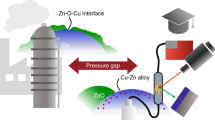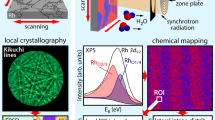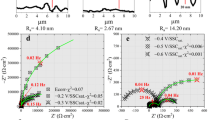Abstract
IN earlier work1 the rate of oxidation of the 110 faces of zinc sulphide was measured by use of a thermobalance. Below 830° C. the rate was found to be ‘chemically controlled’, being an exponential function of temperature and largely independent of the thickness of the product layer of zinc oxide. Above 830° C. there were indications of the onset of a ‘diffusion control’, depending on the diffusion of the oxygen up to the zinc sulphide interface through the layer of porous oxide.
This is a preview of subscription content, access via your institution
Access options
Subscribe to this journal
Receive 51 print issues and online access
$199.00 per year
only $3.90 per issue
Buy this article
- Purchase on Springer Link
- Instant access to full article PDF
Prices may be subject to local taxes which are calculated during checkout
Similar content being viewed by others
References
Cannon, K. J., and Denbigh, K. G., Chem. Eng. Sci., 6, 145 (1957).
Veselovski, B. K., J. App. Chem. (U.S.S.R.), 15, 422 (1942).
Richards, A. W. (unpublished work with Imperial Smelting Corporation, Avonmouth).
Author information
Authors and Affiliations
Rights and permissions
About this article
Cite this article
BEVERIDGE, G., DENBIGH, K. High-Temperature Oxidation of Zinc Sulphide. Nature 183, 106–107 (1959). https://doi.org/10.1038/183106a0
Issue Date:
DOI: https://doi.org/10.1038/183106a0
This article is cited by
-
Oxidation of Galena to Lead Sulphate
Nature (1961)
Comments
By submitting a comment you agree to abide by our Terms and Community Guidelines. If you find something abusive or that does not comply with our terms or guidelines please flag it as inappropriate.



